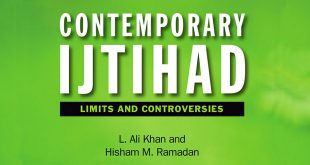This book is a detailed discussion and analysis of Taqleed and Ijtihad and jurisprudence in the light of the Holy Qur'an and traditions. Also...
Read More »Moon Sighting in Islamic Jurisprudence
During this Ramadan, as in some previous years, there have been many questions about the criteria for determining the start of the Islamic month and the role of science and the moon sighting in...
Read More »An Introduction to Islamic Jurisprudence (fiqh), Part 2
In Shahīd Thānī's point of view, ijtihad is contingent upon the knowledge of some studies including: morphology and syntax, terminology, etymology, rhetoric, uṣūl al-fiqh (principles of Islamic jurisprudence), logic, rijāl (scrutiny of...
Read More »An Introduction to Islamic Jurisprudence (fiqh), Part 1
Fiqh is briefly defined as "the knowledge of inferring (istinbāṭ) aḥkām sharʻī". The term istinbāṭ (inference) literally means appearing after being hidden, so extracting water from the depth of a well is called nibṭ. Therefore extracting and discovering aḥkām sharʻī from...
Read More »Ijtihad in Twelver Shiism: The Interpretation and Application of Islamic Law in the Context of Changing Muslim Society
The purpose of the thesis is to investigate whether Islamic laws, without relaxing the nature of the Shari 'a, could be expanded and adapted to meet the changing needs of modem Muslim societies....
Read More »Thou Shalt Emulate the Most Knowledgeable Living Cleric +PDF
The paper, titled "Thou Shalt Emulate the Most Knowledgeable Living Cleric: Redefinition of Islamic Law and Authority in Usuli Shi‘ism," analyses the reconceptualization of Islamic law and authority as defined by Murtada al-Ansari...
Read More »Review on the Book “Kirmānī Shaykhism and the Ijtihād: A Study of Abū al-Qāsim Khān Ibrāhīmī’s Ijtihād wa Taqlīd”
Denis Hermann’s Kirmānī Shaykhism and the Ijtihād: A Study of Abū al-Qāsim Khān Ibrāhīmī’s Ijtihād wa Taqlīd is a valuable and welcome addition to the existing scholarship on Shaykhī studies...
Read More »Article: The Disunity of Islamic Criminal Law and the Modern Role of Ijtihād+PDF
Islamic law, and criminal law in particular, have been closed since its heyday of legal scholarship to external influences and new theoretical arguments and constructs...
Read More »Book: Contemporary Ijtihad limits and controversies
Written from the internal viewpoint of Muslims, the book discusses the resurgence that Islamic law is experiencing in...
Read More »Article: Shi‘i ‘Ulama and Ijāza during the Nineteenth Century
There were two types of ijāzas: an ijāza of ijtihād and an ijāza of riwaya. Modern researchers maintain that an ijāza of ijtihād permitted the holder to exercise ijtihād, and that attaining the ijaza was a prerequisite to...
Read More » Ijtihad Network Being Wise and Faithful Muslim in the Contemporary World
Ijtihad Network Being Wise and Faithful Muslim in the Contemporary World








